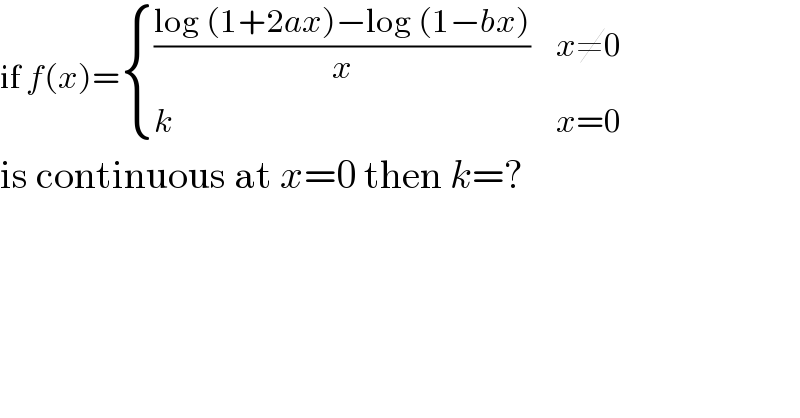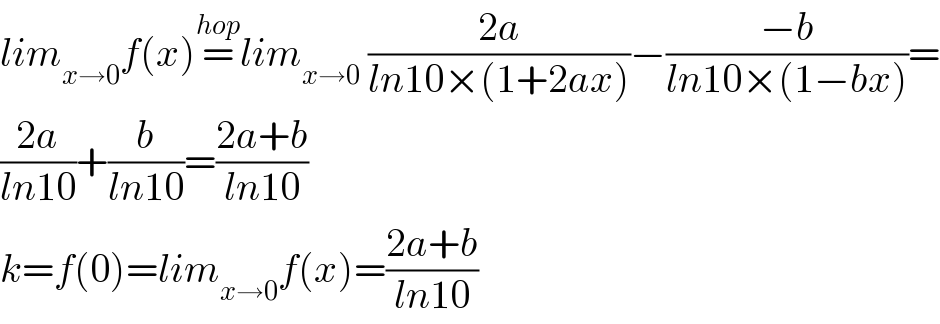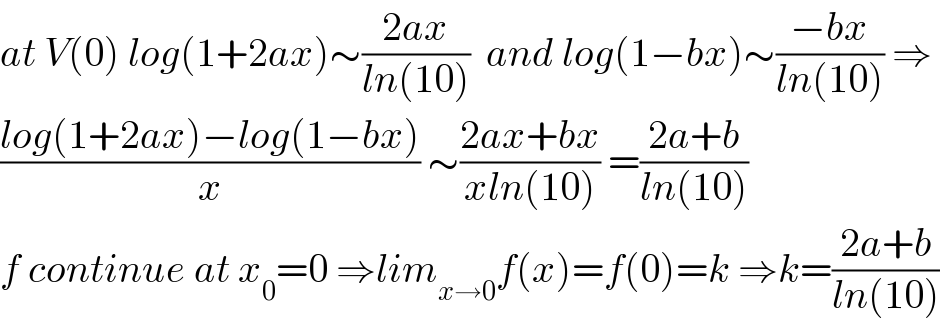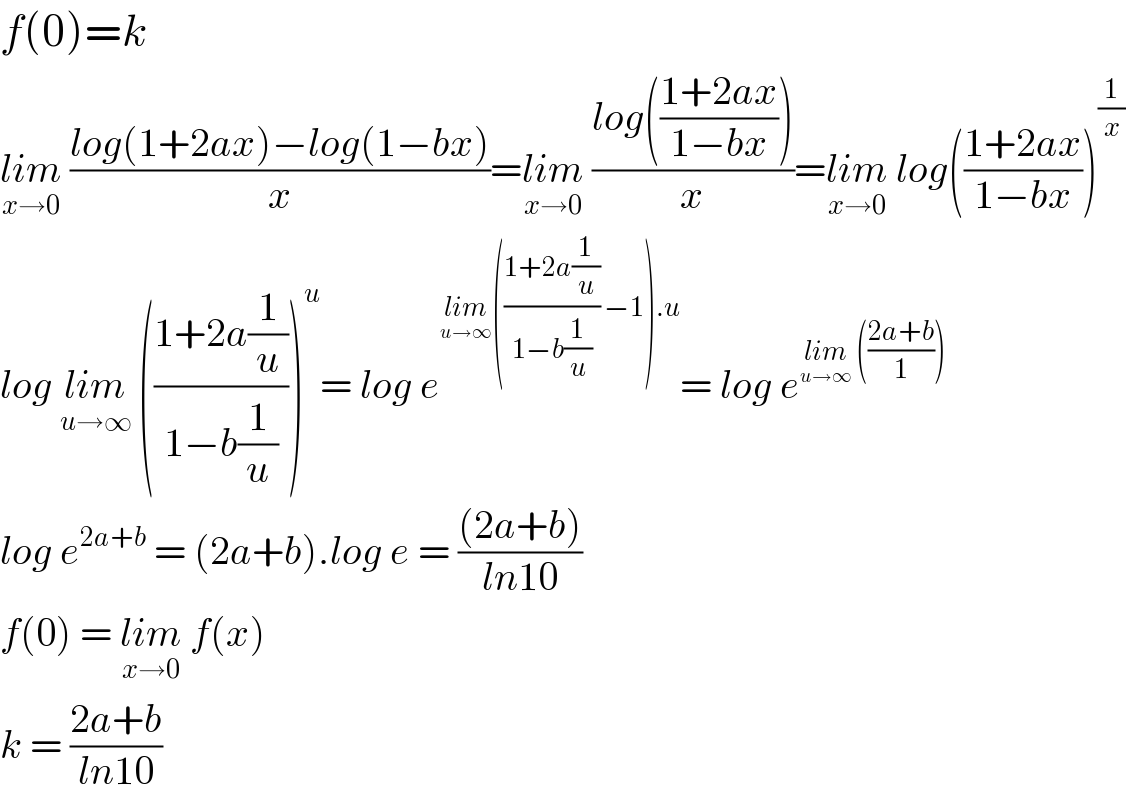
Question Number 63922 by raj last updated on 11/Jul/19

$$\mathrm{if}\:{f}\left({x}\right)=\begin{cases}{\frac{\mathrm{log}\:\left(\mathrm{1}+\mathrm{2}{ax}\right)−\mathrm{log}\:\left(\mathrm{1}−{bx}\right)}{{x}}}&{{x}\neq\mathrm{0}}\\{{k}}&{{x}=\mathrm{0}}\end{cases} \\ $$$$\mathrm{is}\:\mathrm{continuous}\:\mathrm{at}\:{x}=\mathrm{0}\:\mathrm{then}\:{k}=? \\ $$
Commented by kaivan.ahmadi last updated on 11/Jul/19

$${lim}_{{x}\rightarrow\mathrm{0}} {f}\left({x}\right)\overset{{hop}} {=}{lim}_{{x}\rightarrow\mathrm{0}\:\:} \frac{\mathrm{2}{a}}{{ln}\mathrm{10}×\left(\mathrm{1}+\mathrm{2}{ax}\right)}−\frac{−{b}}{{ln}\mathrm{10}×\left(\mathrm{1}−{bx}\right)}= \\ $$$$\frac{\mathrm{2}{a}}{{ln}\mathrm{10}}+\frac{{b}}{{ln}\mathrm{10}}=\frac{\mathrm{2}{a}+{b}}{{ln}\mathrm{10}} \\ $$$${k}={f}\left(\mathrm{0}\right)={lim}_{{x}\rightarrow\mathrm{0}} {f}\left({x}\right)=\frac{\mathrm{2}{a}+{b}}{{ln}\mathrm{10}} \\ $$
Commented by mathmax by abdo last updated on 12/Jul/19

$${at}\:{V}\left(\mathrm{0}\right)\:{log}\left(\mathrm{1}+\mathrm{2}{ax}\right)\sim\frac{\mathrm{2}{ax}}{{ln}\left(\mathrm{10}\right)}\:\:{and}\:{log}\left(\mathrm{1}−{bx}\right)\sim\frac{−{bx}}{{ln}\left(\mathrm{10}\right)}\:\Rightarrow \\ $$$$\frac{{log}\left(\mathrm{1}+\mathrm{2}{ax}\right)−{log}\left(\mathrm{1}−{bx}\right)}{{x}}\:\sim\frac{\mathrm{2}{ax}+{bx}}{{xln}\left(\mathrm{10}\right)}\:=\frac{\mathrm{2}{a}+{b}}{{ln}\left(\mathrm{10}\right)} \\ $$$${f}\:{continue}\:{at}\:{x}_{\mathrm{0}} =\mathrm{0}\:\Rightarrow{lim}_{{x}\rightarrow\mathrm{0}} {f}\left({x}\right)={f}\left(\mathrm{0}\right)={k}\:\Rightarrow{k}=\frac{\mathrm{2}{a}+{b}}{{ln}\left(\mathrm{10}\right)} \\ $$
Commented by raj last updated on 11/Jul/19

$${thank}\:{you} \\ $$
Commented by Mikael last updated on 11/Jul/19

$${f}\left(\mathrm{0}\right)={k} \\ $$$$\underset{{x}\rightarrow\mathrm{0}} {{lim}}\:\frac{{log}\left(\mathrm{1}+\mathrm{2}{ax}\right)−{log}\left(\mathrm{1}−{bx}\right)}{{x}}=\underset{{x}\rightarrow\mathrm{0}} {{lim}}\:\frac{{log}\left(\frac{\mathrm{1}+\mathrm{2}{ax}}{\mathrm{1}−{bx}}\right)}{{x}}=\underset{{x}\rightarrow\mathrm{0}} {{lim}}\:{log}\left(\frac{\mathrm{1}+\mathrm{2}{ax}}{\mathrm{1}−{bx}}\right)^{\frac{\mathrm{1}}{{x}}} \\ $$$${log}\:\underset{{u}\rightarrow\infty} {{lim}}\:\left(\frac{\mathrm{1}+\mathrm{2}{a}\frac{\mathrm{1}}{{u}}}{\mathrm{1}−{b}\frac{\mathrm{1}}{{u}}}\right)^{{u}} =\:{log}\:{e}^{\underset{{u}\rightarrow\infty} {{lim}}\left(\frac{\mathrm{1}+\mathrm{2}{a}\frac{\mathrm{1}}{{u}}}{\mathrm{1}−{b}\frac{\mathrm{1}}{{u}}}\:−\mathrm{1}\right).{u}} =\:{log}\:{e}^{\underset{{u}\rightarrow\infty} {{lim}}\:\left(\frac{\mathrm{2}{a}+{b}}{\mathrm{1}}\right)} \\ $$$${log}\:{e}^{\mathrm{2}{a}+{b}} \:=\:\left(\mathrm{2}{a}+{b}\right).{log}\:{e}\:=\:\frac{\left(\mathrm{2}{a}+{b}\right)}{{ln}\mathrm{10}} \\ $$$${f}\left(\mathrm{0}\right)\:=\:\underset{{x}\rightarrow\mathrm{0}} {{lim}}\:{f}\left({x}\right) \\ $$$${k}\:=\:\frac{\mathrm{2}{a}+{b}}{{ln}\mathrm{10}} \\ $$
